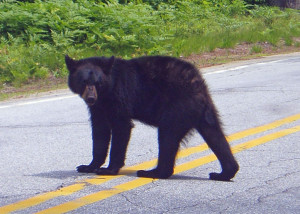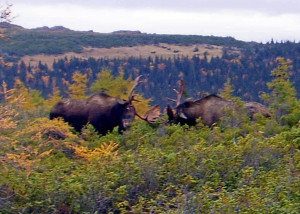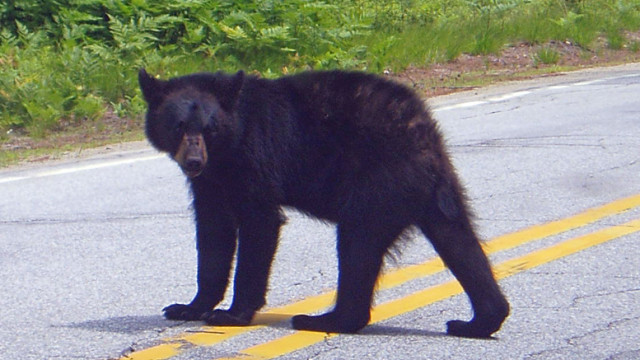
For some reason, one of the questions I get most frequently, both from readers and from folks who discover that I do a lot of hiking, camping and wilderness backpacking have to do with bears.
The questions often come down to one essential point: “Aren’t you afraid of bears?”
The answer is a qualified “No.”
I definitely respect bears. They are, after all, large, powerful predators. And anyone with any common sense takes reasonable precautions to avoid bad encounters with bears. But, no, I don’t fear bears. Nor should you.
Bad encounters between humans and the black bears that inhabit the northeast are rare. There haven’t been any bear attacks here that I know of in centuries. Most human-bear encounters these days are a bear taking advantage of a ready food source from a backyard bird feeder, pet food left out overnight, unsecured garbage cans, etc. These encounters are always the human’s fault and therefore preventable. Unfortunately any human/bear encounter these days almost always ends badly for the bear and it isn’t the bear’s fault.
Have you ever heard the saying “A fed bear is a dead bear?” It’s true. Whether it’s unintentional, or from some foolish person who intentionally puts out food for the bears, it always turns out badly for the bear.
Bears that learn to associate humans with food sources almost inevitably start acting aggressively to defend what they consider “their” food source. It’s bears being bears. Unfortunately, aggressive bears tend to get shot.
A couple of weeks ago, EasternSlopes.com Publisher and Senior Editor David Shedd and I were camping in a remote spot we visit several times each year. We’ve never seen another backpacker in the area. There are bears here, though—we’ve seen them often and almost always see fresh bear sign.
We take normal precautions, keeping our cooking area and all our food well away from the pitched tents and cleaning up our camp area, but I admit we aren’t as careful as we could be. We’ve never had a problem here, and, frankly, I don’t expect to. For one thing, this is hunting country and the bears are naturally shy. For another, we don’t camp here often enough to get the bears to think of this as a regular food source.
In fact, I’ve never had a problem in any remote campsite. As a result we may have gotten a little too careless and may be setting ourselves up for trouble in the future. Time to re-assess. We usually have pepper spray with us, but that’s a absolute last-resort. Better to take precautions to avoid trouble before it begins. Again it’s a matter of respecting bears who are being bears.
Driving home from that trip, I encountered a young bear I photographed from my car. (Big ears + long legs = small bear) He was hanging out not far from a commercial campsite and showed no fear of my car or me. Sadly, this was a dead bear walking. It’s only a matter of time .
Problems begin where people camp regularly. Lots of people leave lots of food around—intentionally or unintentionally. Bears find and eat it. The bear learns that campgrounds mean food and they start protecting it.
Eventually, they get trapped, tagged and transported away; if they come back, or find another human-associated food source, they get shot. Sad end of story.
I’m really, really careful in roadside campsites. You should be, too, unless you want to be the first recorded bear attack in the northeast in recent history. You can avoid any potential for trouble by keeping your campsite clean and all food safely stored away in sealed containers inside your car.
I’m also more wary in established backcountry campsites such as the shelters and designated camping spots along major trails. Again, any place where people stay and eat. If a bear’s discovered a reliable food source, it’s only a matter of time before trouble develops. Camping shops now have “bear proof” containers to store your food in. They add weight and bulk to your pack, but they also help keep your food, you, the people who follow you, and the bears themselves safe.
So if you’re out in bear country, just be prepared to give them the thought and respect they deserve. Life isn’t a spectator sport. Get out and enjoy!

Moose To Mice To Mosquitoes
As far as I’m concerned, the most dangerous large animal in the northeastern woods (other than people, of course) are moose. A mama moose with a baby nearby is nearly a thousand pounds of overprotective motherlove waiting to stomp any perceived threat.
Likewise a bull moose drunk with testosterone in the height of the fall rut is nothing to fool with. Generally speaking, I try to keep my distance from moose. I’d recommend you do the same.
Summer is the time when Rabies rears it’s ugly head. It’s rare, but not rare enough. The best protection from rabies is to be aware of your surroundings. If you see an animal that isn’t afraid of you, move away; if you get bitten by any mammal, see your doctor.
Rodents are always a potential source of annoyance (and disease) when you’re camping. Mice proliferate near campsites. Camp in any shelter along the Appalachian Trail and you’ll spend half the night fending off attacks on your food supply by aggressive mice.
The best prescription for mice, and other occasionally troublesome critters like raccoons is the same one for bears: keep a clean camp, secure your food supply.
In my mind, the title for most dangerous and annoying critters in the woods belongs hands down to black flies, mosquitoes and ticks, which can drive you nuts with their relentless attacks and knock you down with disease if they get through. Sure, the diseases are rare, but the bugs themselves aren’t, so why take a chance.
For the past couple of years, I’ve been using an insect repellent called Ultrathon. It contains a timed-release form of DEET in a cream or spray-on base and lasts much longer than any other product I’ve tried. It works.
You can also use protective clothing other bug strategies. Kids need special bug protection.
Bear Resources
There’s more good bear info to be had at these web sites:
www.wildlife.state.nh.us/Wildlife/Somethings_Bruin.htm
www.mass.gov/dfwele/dfw/wildlife/living/living_with_bears.htm
For bearproof storage containers, Check out: Bearikade, Bear Vault, Ursack and Backpackers Cache for examples. They aren’t cheap, but they do protect your food from bears and other critters. Most good camping shops will have one or more available.


